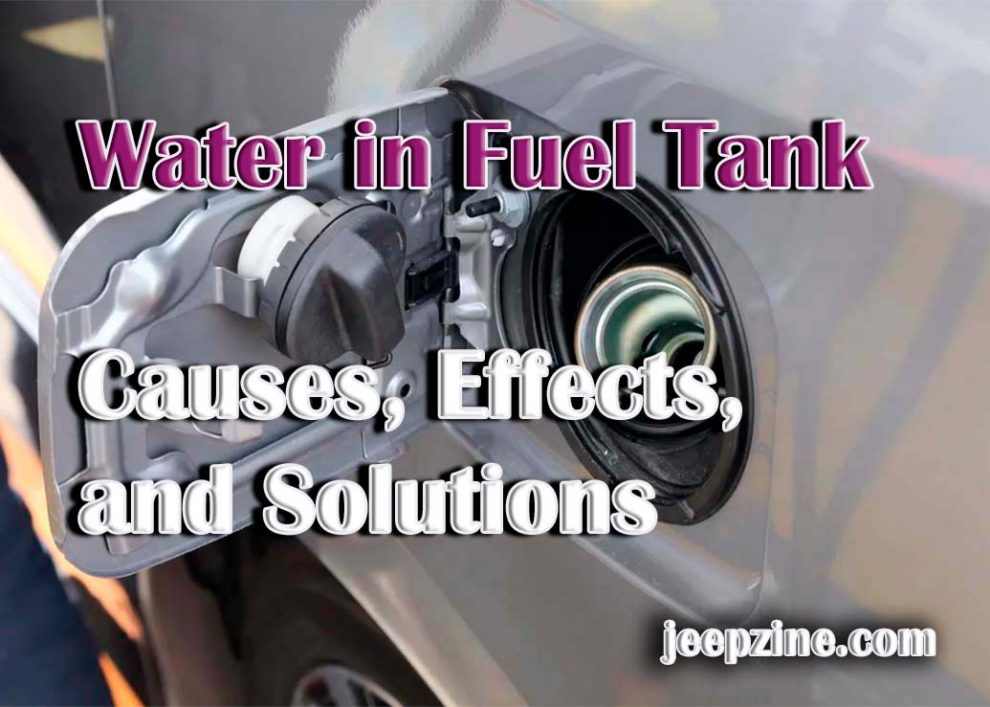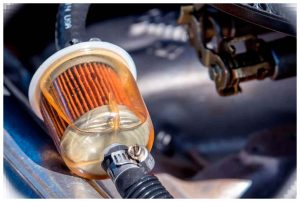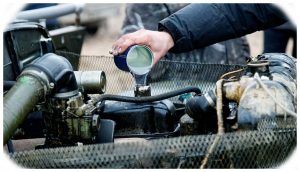Water contamination in fuel tanks is a common issue that can seriously affect engine performance, fuel system components, and overall vehicle health. This guide provides essential information on what causes water contamination in fuel tanks, its effects on your vehicle, and how to detect and prevent it from occurring.
Water contamination occurs when unwanted moisture enters a fuel tank and mixes with the existing supply of gasoline or diesel. This amount of water should not exceed 0.2 percent of the tank’s total capacity as any more than this could damage the engine’s components and reduce performance.
Water contamination in the fuel tank can cause considerable damage to the engine and other components associated with the vehicle’s powertrain. These problems may include poor functioning due to reduced power output, accelerated wear due to corrosion or rusting parts, damaged injectors, and blocked filters which further reduce efficiency if left untreated for long periods. As such it is important to understand what causes water contamination in order to prevent such problems from occurring in your car or truck.
Causes of Water Contamination in Fuel Tanks
There are several different causes that can lead to water contamination in fuel tanks. These include:
-
Moisture in the Air – Humidity levels can vary depending on the time of day and season, which can increase the amount of moisture present in the air around your vehicle. This moisture can enter through tiny cracks or cap openings, settling into your fuel tank.
-
Condensation – When cold air comes into contact with a warm fuel tank, condensation is created which drips down into the reservoir and mixes with existing fuel supplies. This is a common problem during winter months when temperatures drop substantially overnight.
-
Tank Leaks – Leaking fuel tanks are another common cause of water contamination as these cracks and leaks allow excess moisture to enter your system through surface contact with surrounding environments such as rain or snowfall.
-
Improper Storage – If fuel tanks are not properly stored, moisture can enter through the tank’s seal or cap. This is especially true when containers are left outdoors or in humid environments, such as a garage with no temperature control.
Effects of Water Contamination in Fuel Tanks
Water contamination in fuel tanks can cause several types of damage to your vehicle’s engine and its associated components. These include:
-
Engine Damage – When water enters the fuel tank, it can cause cavitation, when air bubbles form inside the tank, resulting in pressure changes that can damage the engine’s components, such as sleeves and pistons.
-
Corrosion – Water can also mix with fuel and form an acidic solution which causes corrosion on metal surfaces inside the tank, leading to further issues related to performance and efficiency and costly repairs down the line.
-
Fuel System Damage – Water contamination can also reduce injector performance, contaminate filters and lead to clogged lines due to sediment buildup caused by moisture mixing with dirt particles or other debris inside your system. Keeping your fuel system clean is vital to ensure optimal performance and efficiency levels over time.
-
Poor Vehicle Performance – One of the most common effects of water contamination is a decrease in overall vehicle performance due to reduced power output resulting from corroded or clogged parts found within the system itself.
How to Detect Water Contamination in Fuel Tanks
It is possible to check for water contamination in fuel tanks by performing simple tests. These include:
-
Visual Inspection – Inspecting your fuel tank visually can help you spot any signs of leakage which could indicate the presence of water contamination in the area.
-
Fuel Testing – You can also take a sample of fuel from the tank and use a water-testing kit to detect the water levels present in your fuel.
-
Performance Issues – Engine performance can also be affected by water contamination, leading to decreased power output and other problems such as sluggish acceleration or stalling when accelerating from standing still or during high-speed driving conditions. This method is one of the most reliable ways to detect any signs of water contamination and should not be overlooked when assessing your vehicle’s condition.
Prevention of Water Contamination in Fuel Tanks
The best way to prevent water contamination in your fuel tank is to ensure proper storage and maintenance practices are followed throughout the vehicle’s life. These include:
-
Proper Storage – Always keep your vehicle covered when not in use and check for any signs of leakage or cracks that could allow moisture to enter the system.
-
Regular Fuel System Maintenance – It is important to regularly inspect and service your fuel system components to ensure they are in good working order and ensure any dirt or debris has been removed from tanks before use.
-
Using Water Absorbing Fuel Additives – Aftermarket products such as water absorbing fuel additives can help reduce the amount of water contamination inside tanks but should be used with caution, only when necessary, and according to the manufacturer’s instructions.
-
Keeping Tanks Tight and Dry – Make sure that all openings on the tank are tight and dry, particularly during wet weather conditions where excess moisture can easily enter your system through these gaps if left unmonitored for prolonged periods of time.
Solutions for Water Contamination in Fuel Tanks
If you have detected signs of water contamination in your fuel tank, you should immediately reduce the damage caused by this issue. These solutions include:
-
Removing Water from the Fuel Tank – You can use a specialized tool to remove any accumulated water from the bottom of fuel tanks by draining or vacuuming out of the system.
-
Replacing Contaminated Fuel – If you suspect that water is present in your fuel supply, it is important to replace this with fresh supplies as soon as possible to prevent any further damage occurring due to prolonged exposure.
-
Repairing Tank Leaks – If there are any cracks or leaks present in your tank then these should be repaired as soon as possible using an appropriate sealant or repair kit designed for fuel tanks specifically and accompanied with regular visual inspections on a monthly basis to ensure that these repairs remain effective over time.
-
Replacing Fuel System Components – Depending on the severity of water contamination and its effects on other components associated with your fuel system, it may be necessary to replace some parts such as filters, injectors or other components that may have suffered damage due to corrosion caused by prolonged exposure.
Conclusion
In conclusion, water contamination in fuel tanks can have serious ramifications for engine performance and vehicle health if left untreated for long periods of time. It is important to understand what causes water contamination, how to detect it and the solutions available to prevent or reduce its effects on your car or truck. By following the prevention tips outlined in this guide, you can ensure your vehicle remains free from water contamination and any unnecessary damage caused by this issue.


 Fuel System Damage – Water contamination can also reduce injector performance, contaminate filters and lead to clogged lines due to sediment buildup caused by moisture mixing with dirt particles or other debris inside your system. Keeping your fuel system clean is vital to ensure optimal performance and efficiency levels over time.
Fuel System Damage – Water contamination can also reduce injector performance, contaminate filters and lead to clogged lines due to sediment buildup caused by moisture mixing with dirt particles or other debris inside your system. Keeping your fuel system clean is vital to ensure optimal performance and efficiency levels over time. Using Water Absorbing Fuel Additives – Aftermarket products such as water absorbing fuel additives can help reduce the amount of water contamination inside tanks but should be used with caution, only when necessary, and according to the manufacturer’s instructions.
Using Water Absorbing Fuel Additives – Aftermarket products such as water absorbing fuel additives can help reduce the amount of water contamination inside tanks but should be used with caution, only when necessary, and according to the manufacturer’s instructions.
Add Comment